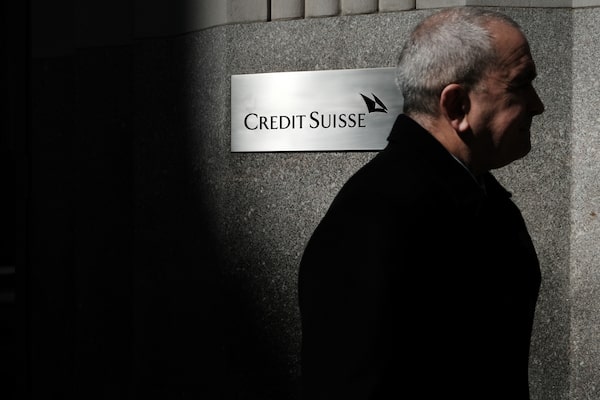
People walk by the New York headquarters of Credit Suisse on Mar. 15 in New York City.Spencer Platt/Getty Images
John Rapley is a political economist at the University of Cambridge and managing director of Seaford Macro.
One week into the 2023 chapter of the financial crisis, and it’s clear this is no 2008 redux. It may even end up being worse.
We’ve not seen, and won’t see, a generalized financial collapse, nor a wholesale run on the banks, to be sure. The banking system is in better shape than it was then and this month’s difficulties have been confined to the United States and Switzerland. But in 2008, tepid inflation and low debt levels left governments and central banks with leeway to spend their way out of trouble. Today, with inflation high and pandemic debt burdens weighing heavily, there’s less room for manoeuvre.
Meanwhile the course they must steer gets trickier by the day. Central banks had blundered into the high-inflation regime in which we find ourselves. Now, they seemed finally to be reversing out of trouble. The sharp rise in interest rates was starting to eat into profits and asset values, helping to lower inflation, thereby moderating wage demands. But while it’s coming down, inflation is nowhere near contained.
In some countries, it shows no signs of disappearing anytime soon. That will prompt central banks to keep sucking money out of circulation, with further interest rate rises the primary means of doing so. The problem is, central banks had not only blundered their way into inflation, they had also blundered their way into the high-debt regime we now have and have had for decades. During all those years when real interest stayed close to zero, banks loaded up on it – after all, borrowing was a one-way bet when the money was all but free and it could be recirculated at a profit.
Rising interest rates, which make debt more expensive, are thus choking revenues now. That’s why regional U.S. banks, with their smaller cash cushions, are struggling. To forestall contagion, central banks are facing demands to pause, or even reverse, their rate rises. But any such moves will almost certainly be temporary, since the longer inflation stays elevated, the stickier it gets. Thus in the end, interest rates may go even higher than forecast, and stay there well into next year at least.
Eugene Zhang: The doom that came to Silicon Valley: For startups, this banking crisis is much needed
That, in turn, will likely cut short the relief rally we saw in markets this past week. As the year unfolds, stocks will probably be back in a bear market. Real estate won’t be far behind. At some point in the year, too, another bout of major disruption may emerge among some big investors, like pension and insurance funds or private equity, which are sitting on big losses they haven’t yet realized.
So this drama is just beginning. Lest all this seem gloomy, there’s still some good news to be had. Fundamentally, the economy is sound. Real wages have just turned positive. That’s not only good for working people but also means demand will likely remain strong enough to keep the economy from sliding into anything worse than a shallow recession. And while mortgage bills will tighten belts, working people whose real earnings are rising will be able to weather the storm.
Investors and anyone who lives off their asset income, on the other hand, will face a rough ride. In that respect, the fallout of this crisis mirrors that of 2008. Then, owners and managers walked away relatively unscathed and working people took the hit. This time, the opposite is happening. This isn’t bad just for the ultrawealthy. Anyone who dabbles in the markets, anyone with property they rent out, anyone with a pension plan, anyone who rode the boom of the past decade and is now feeling the pinch might soon feel hard done by, no doubt blaming the central bank for their falling wealth.
But they shouldn’t. Much of the wealth we imagined we’d created over the past decade, in stocks, bonds, property, crypto or you name it, was illusory. Central banks had flooded the economy with money, bidding up the prices of assets. But now that the effect of a weakening currency has begun to show up in the real economy, in the form of consumer price inflation, central banks are having to ask for the money back.
In effect, those falling asset prices are investors being forced to return it. Whatever real wealth was created over the past decade will endure, but those who surfed the waves of cheap money are going to have a hangover.